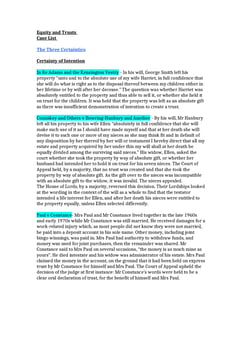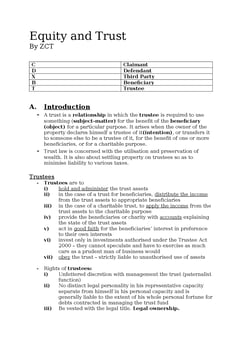Bannister v Bannister [1948] 2 All ER 133
Judgement for the case Bannister v Bannister
Table Of Contents
KEY POINTS
Constructive trust can be invoked when someone insists on an absolute conveyance to themselves, intending to defeat a beneficial interest that rightfully belongs to another.
Fraud triggers this principle as soon as the absolute character of the conveyance is asserted to defeat the beneficial interest, regardless of how the conveyance was obtained.
Statutes like the Statute of Frauds or the Law of Property Act 1925 cannot be used as defenses when there is no written evidence of the bargain. The bargain leading to an absolute conveyance doesn't need to state that the grantee will hold as a trustee explicitly; it is sufficient if it includes an arrangement where some defined beneficial interest in the property is to be held by another.
There's no fundamental difference in principle between a situation where the purchaser retains the entire beneficial interest in a part of the property and one where only a limited beneficial interest in a part of the property is retained by the vendor.
FACTS
The defendant sold two cottages to the plaintiff with an oral agreement that the plaintiff would allow her to stay in one of the cottages without paying rent indefinitely. The plaintiff paid GBP 250 for the cottages, significantly less than their contemporary market value, valued at GBP 150 higher. Following the sale, the defendant continued to reside in one of the cottages without paying any rent.
The plaintiff served the defendant with a notice to quit, but the defendant refused to vacate the premises.
Subsequently, the plaintiff claimed possession of the cottage occupied by the defendant, asserting that the defendant was essentially a tenant at will, occupying the property without paying rent and that her tenancy at will had been properly terminated through the notice to quit.
JUDGEMENT
The defendant's cottage sale was explicitly based on the oral undertaking. It can be reasonably assumed that this undertaking was integral to her decision to sell the property and that she regarded it as reserving a benefit of at least GBP 150. Therefore, this oral agreement created a life interest, which could be terminated upon the defendant's cessation of occupancy.
The absence of fraud in this case does not absolve the plaintiff from acting fraudulently. He insisted on the absolute character of the conveyance with the intent to undermine the beneficial interest he had previously agreed the defendant should retain.
The absence of a written agreement is immaterial in this case for the same reason, despite the provisions of sections 53 and 54 of the Law of Property Act 1925.
COMMENTARY
Constructive trusts were pivotal in safeguarding equitable principles and protecting rightful interests. They came into play when someone sought an absolute conveyance to deprive another of a rightful benefit, triggering the principle of fraud. This principle applied regardless of how the conveyance was obtained, emphasizing fraudulent intent.
Notably, statutory provisions like the Statute of Frauds and Law of Property Act 1925 couldn't defend cases lacking written evidence. The absence of a trustee declaration wasn't essential; defining a beneficial interest in the agreement sufficed, ensuring flexibility in protecting equitable interests.
In the case of two cottages, the defendant's oral agreement with the plaintiff created a life interest, allowing her rent-free occupancy. Despite no fraud, the plaintiff's insistence on absolute conveyance had been deemed fraudulent, emphasizing the pivotal role of intent.
The absence of a written agreement hadn't mattered due to this fraudulent intent, highlighting the court's commitment to preserving equitable principles despite statutory provisions.
ORIGINAL ANALYSIS
Plaintiff transferred two flats to her brother and agreed orally that she should have a right to live in one for the rest of her life.
-
When he tried to evict her, on the grounds that there had been no written trust, as s.53(1)(b) required, the CA held that a constructive trust arose in her favour, which is exempted from the need for writing under s.53(2).
This was on the grounds that although Defendant had no fraudulent intent at the time of the transfer and oral undertaking, it would be fraudulent if he were to rely on his strict legal rights. Thus a broader meaning of fraud is used.
NB different methodology to Rochefoucauld - that used parol evidence to find an express trust, whereas this uses constructive trust.
To find CTs wherever there are express trusts not in writing completely emasculates s.53(1) whose purpose is to force people to put their express trusts in writing! This is made particularly broad here since there wasn’t even fraud at the time of conveyance.
RELATED CASES
For Further Study on Bannister v Bannister

A collection of the best GDL notes the director of Oxbridge Notes (an O...
Need instant answers? Our AI exam tutor is here to help.
Ask questions 🙋 Get answers 📔 It's simple 👁️👄👁️
Our AI is educated by the highest scoring students across all subjects and schools. Join hundreds of your peers today.
Get StartedSimilar Cases
Related Product Samples
These product samples contain the same concepts we cover in this case.
| GDL Equity and Trusts | Constructive Trusts Of Property And Constructive Trusts Of The Home Notes (17 pages) |
| Trusts and Equity | Trust Formalities Notes (19 pages) |

 Since 2010, Oxbridge Notes has been a trusted education marketplace, supplying high-quality materials from top achievers at universities like Oxford, Cambridge, LSE, Harvard, and Yale.
Since 2010, Oxbridge Notes has been a trusted education marketplace, supplying high-quality materials from top achievers at universities like Oxford, Cambridge, LSE, Harvard, and Yale.